#fossil fuel civilization
Text

Solid Fuel Advisory Service ad (1980)
52 notes
·
View notes
Text
By Jake Johnson
Common Dreams
Sept. 16, 2023
"California's move is an unmistakable sign that the wave of climate lawsuits against Big Oil will keep growing and that these polluters' days of escaping accountability for their lies are numbered."
The state of California on Friday filed suit against ExxonMobil, Shell, BP, ConocoPhillips, and Chevron, accusing the five oil and gas giants of a decadeslong campaign to mislead the public about the threat fossil fuels pose to the climate.
The lawsuit makes California the largest economy on the planet to take legal action against fossil fuel companies over their efforts to deceive the world about their destructive—and immensely profitable—business model. California is also a major producer of oil and gas.
"This has been a multi-decade, ongoing campaign to seek endless profits at the expense of our planet, our people, and the greedy corporations and individuals need to be held accountable," California Attorney General Rob Bonta toldThe New York Times in an interview on Friday. "That's where we come in."
With its new civil lawsuit, filed in a San Francisco court, California joins Rhode Island, Minnesota, Connecticut, Massachusetts, Vermont, and other states that have sued the fossil fuel industry over its role in massive climate damages. Dozens of municipalities, including several in California, have also filed lawsuits against oil giants.
Read more.
#california#civil lawsuit#exxonmobil#shell oil#british petroleum#conocophillips#chevron#big oil#rob bonta#fossil fuels#climate crisis#climate change#extreme weather#wildfires
20 notes
·
View notes
Text
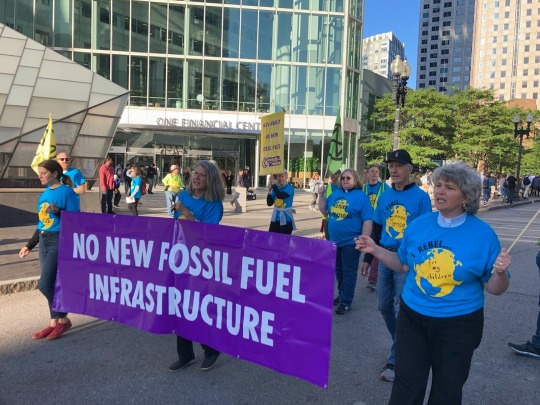
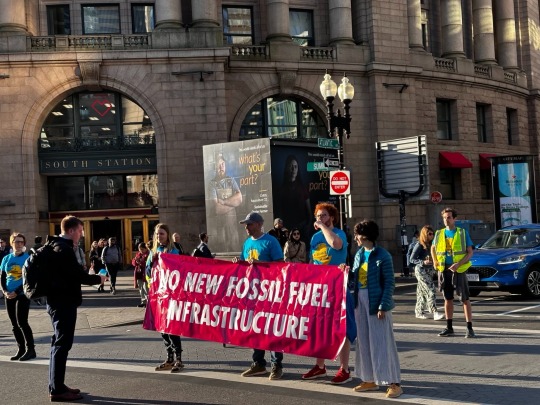
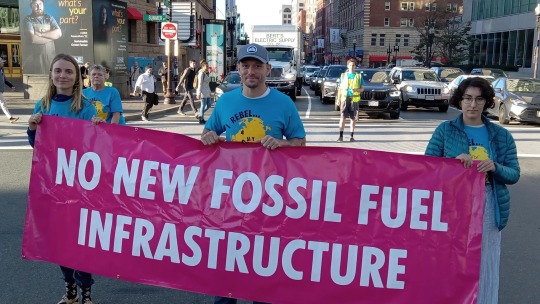




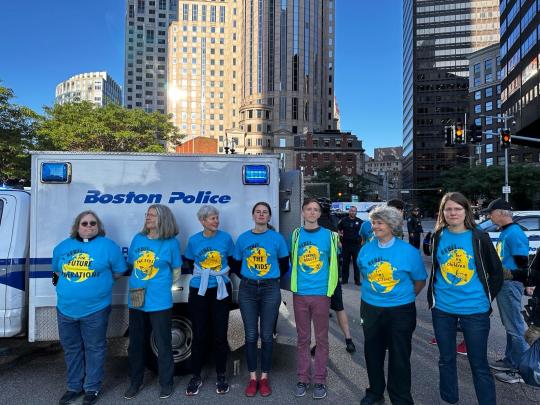

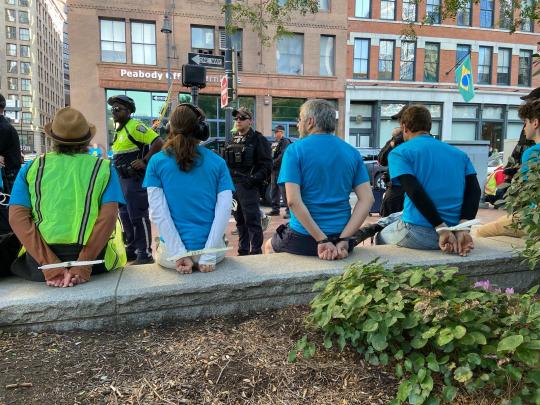

Climate Activists Disrupt Boston Rush Hour Traffic
On Thursday September 21, more than 35 climate activists from XR Boston shut down traffic around the financial district to demand that the Healey administration ban new fossil fuel infrastructure. Three independently moving groups of XR rebels marched slowly around the intersections of Atlantic Ave and Seaport Blvd., Atlantic Ave. and Summer St., and Purchase St. and Summer St. creating traffic gridlock. The activists communicated that they would refuse to end their traffic disruption unless the Governor made a public statement committing her administration to opposing all new fossil fuel infrastructure projects, including the expansion of airports and gas connections in new buildings.
The activists wore blue shirts with yellow illustrations of the Earth accompanied by slogans "I rebel for..." followed by personalized messages (my kids, a livable future, etc.). They held large banners reading "No New Fossil Fuel Infrastructure" and chanted "Governor Healey, you make the rules, time to ban new fossil fuels," "Massachusetts, don't delay, ban new fossil fuels today."
When asked why he chose to participate in non-violent civil disobedience, Monty Neill, an event organizer and one of the arrested climate activists, replied "My grandchildren are facing a world of climate and ecological collapse, with social crises inevitably following. How bad it will be depends on what we do today. An easy first step in Massachusetts is to halt fossil fuel expansion. Leaders must lead, not see what lobbyists say or fear to ‘spend their political capital.’ Governor Healey and the legislature must act now, no more delays."
Jana Pickard-Richardson, another activist with XR Boston, added "I’m risking arrest today out of love and rage. Love for the millions upon millions who stand to lose their homes, and even their lives in this worsening climate crisis. And rage at the politicians who have wasted decades with incremental actions and business as usual. And now as the signs of the crisis unfold around us, our government still is not acting with the urgency the situation demands."
Over 20 activists were arrested after blocking rush hour traffic for almost 30 minutes. In an August meeting with XR Boston, Climate Chief Hoffer admitted Massachusetts won't make its legally binding target to reduce emissions 50% by 2030, per the 2021 Act Creating A Next-Generation Roadmap for MA Climate Policy. She promised that the Healey administration would release a statement shortly. There has been no statement. We are escalating. Our lives depend on it.
Photos by Cam Lawless, Jesse Kieffer, Skip Schiel, Haley McH, Jule Manitz
#boston#extinction rebellion#civil disobedience#climate activism#xrboston#general disruption#traffic#rush hour#slow march#arrests#non-violent#week of rebellion#climate emergency#fossil fuels
10 notes
·
View notes
Text
So....Climate Change. I don't think a lot of people realize just how big of a deal it is. Or they do, but it's too big and scary to look completely at. Trust me, I was there too. (Still have been some days) But guys, this is an emergency for the WHOLE WORLD.
Temperatures are rising and destroying so much of the incredible aspects of nature, from our soil, to our wildlife! (Did you know that we've lost 40% of our insects?!) India and Pakistan had a mind boggling and dangerous as hell heat wave. Wildfires are becoming more and more frequent. It will only rise and continue as long as our governments don't get us AWAY FROM FOSSIL FUELS COMPLETELY. And hey would ya look at that, THEY'RE DOING THE EXACT *OPPOSITE*. The fossil fuel industry is incredibly profitable, especially right now. And that's all they care about! Money over lives. Money over kids *futures*. They have been making plans for more of what are called "Carbon Bombs". This CAN NOT HAPPEN. It will spell out CATASTROPHIC CLIMATE BREAKDOWN.
This shit is scaring the hell out of me every single day! It should scare the hell out of everyone!! But I'm not saying all of this to send people into a spiral of hopelessness, no. Very much the opposite. This is me urging EVERYONE to. Take. More. Action. This is an URGENT CRISIS. We need to take major action to put pressure on our government to be DONE with fossil fuels and to rely completely on green, alternative power sources. The best ways to do that seem to be protesting and civil disobedience, and/or supporting those groups financially. (As well as any other healthier things you can do, like composting, eating less red meats, biking to places more often etc. Though protesting with civil disobedience seems to bring about the biggest change.)
There are so many incredibly brave indigenous groups and climate groups all over the world putting pressure on their government. I've been watching the amazing work of Extinction Rebellion in NYC! I've been supporting them financially as often as I am able! There's also an Extinction Rebellion group here in Chicago! I plan on protesting with them when they do! I also highly recommend learning a lot more about climate change in general and many other ways of fighting against it. There are so many amazing, brave, intelligent people giving us the information, hope, and will we need to fight against this crisis. I will keep sharing all of them here with you!
We make our hope! We make it by taking action, and coming together as a community to fight this together! We're not alone in all of this. There are so many fighting, informing, and supporting us.
I know life is already so overwhelming. We all have our lives, our children, our jobs, school, and everything in between. But guys, life is going to get a HELL of a lot more difficult, scary and overwhelming if we keep doing what we've been doing. We all deserve a bright, peaceful future on this beautiful planet of ours! I won't stop fighting and doing everything in my power to fight against this. I hope you will too.
#climate crisis#climage change#tw climate change#emergency mode#protesting#civil disobedience#carbon bomb#fossil fuels#global warming#important#signal boost#extinction rebellion
2 notes
·
View notes
Text
youtube
#Youtube#pay attention#fossil fuels#renewableenergy#knowledge is power#petrochemical#usa#military#civilization collapse
0 notes
Text
Mobilize action for a just and inclusive transition to clean energy.

The International Day of Clean Energy on January 26th is a call to raise awareness and mobilize action for a just and inclusive transition to clean energy for the benefit of people and the planet.
Did you know that:
Coal, oil, and gas (fossil fuels) are responsible for nearly 90% of global carbon dioxide emissions.
Scientists emphasize the need to cut emissions by almost half by 2030 and achieve net-zero by 2050 to avoid the worst impacts of climate change.
Fossil fuels still dominate global energy production, but renewable sources of energy, such as wind, solar, hydro, and geothermal, now power about 29% of electricity worldwide.
#international day of clean energy#civil society organizations#climate#business organizations#state governments#fossil fuels#carbon dioxide emissions#greenhouse gases#electricity#sdg7#sustainable energy#renewablefuture#reliable energy#renewable energy sources#affordable energy#energy transition#clean energy
0 notes
Text

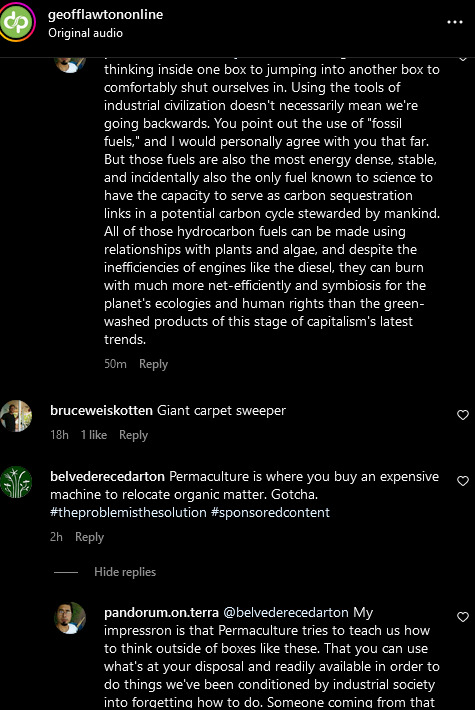
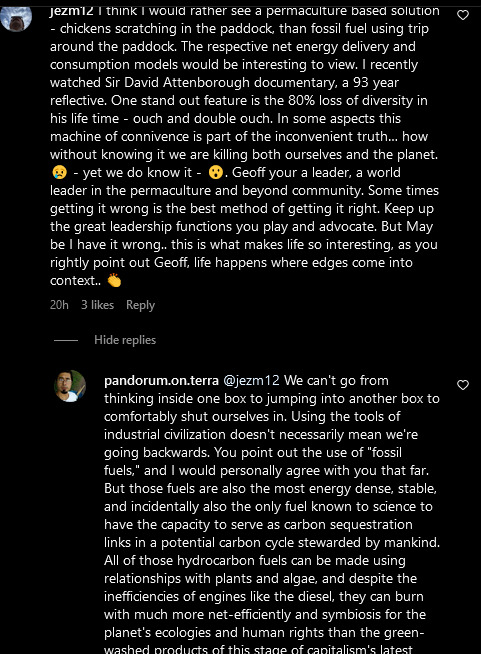
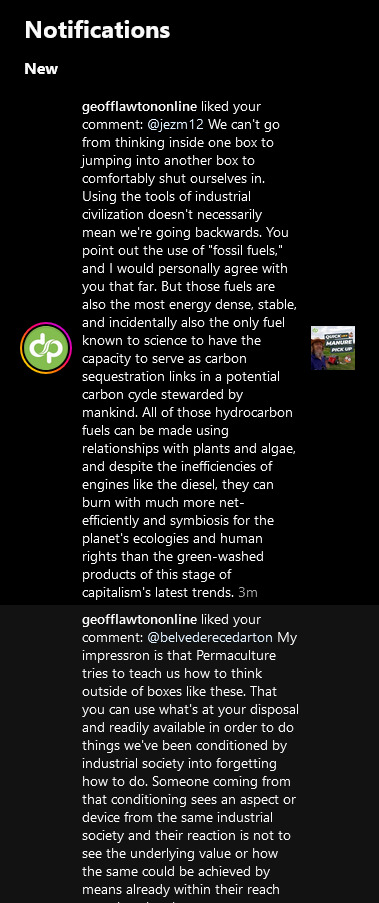

Some people sound a bit like luddites when it comes to using modern technology or fossil fuels in the contexts of sustainability-- as if they've only parroted climate change political propaganda and never seen the value of biofuels in a potential carbon sequestration scheme.
#permaculture#instagram#mine#solarpunk#culture#group dynamics#123#fossil fuels#hydrocarbons#biofuels#climate change#capitalism#greenwashing#industrial civilization#peak oil
0 notes
Text
Hey folks let me anti-doomscroll you for a quick second:
Batteries and Solar have been getting cheap very quickly for a long time now and not only is it not stopping, but even at the rates it's at the economics of energy are shifting rapidly. The costs of decarbonizing all forms of electric power are now more down to infrastructure and planning than bulk cost. Compare and contrast to the turn of the century when Solar was so prohibitively expensive that saying we'd meet any meaningful fraction of our needs with photovoltaics would have gotten you laughed out of the room.
Meanwhile, although there are lots of complicated moving parts and a surprising amount of gross politics attached, gas cars are now less good in most ways than electric. Again, at the turn of the century this would have sounded laughable.
Many industries have specific needs that prevent direct conversion to electric, but hydrocarbon fuels are not intrinsically fossil fuels and can be made as a storage medium for solar. Hydrocarbon fuels made in this way are intrinsically carbon neutral. The technology is relatively young, but from a basic math perspective looks very doable.
Inflation actually has more to do with the above than it does with whatever it is the federal reserve does, and pulling down a supply of energy from the sky that requires less infrastructure to get (which is true because that's why it's cheaper now) directly helps.
The current "business as usual" scenarios with global warming are lower than they used to be, because the solar transition is just sort of happening because of economics without a lot of government help. All of the above lower the amount of friction and pushback we face when trying to get the government to do something.
By the way, the Inflation Reduction Act, passed by Joe Biden a couple years back, is explicitly designed to accelerate these trends.
As disastrous as the current projections for global warming are, it's important to keep two things in perspective: first, that they are exactly that, disasters, not the end-of-the-world kind but more sort of the hurricanes and floods kind, and second, while they certainly will get worse before they get better, they can and will get better. What we do now from a policy perspective has an outsize impact on how much flooding, droughts, and other weather-related costs we will face in the decades to come, but "human civilization ends" is not actually particularly likely. It is much more realistic to say "we could have a huge number of climate-related disasters or a moderately increased number, and every little bit of policy work helps move the needle".
We can and we will solve global warming, the question is not if but when, and how many lives can we save or improve by acting as soon as possible. Imagining this as an almost-certain death sentence for the future of humanity and nature is not merely unrealistic, but wildly counterproductive. It is paralyzing and enervating when what will do the most good is planning, policy, and communication.
Remember, despair is not a tool for positive change. Hope is the real language of revolution.
396 notes
·
View notes
Text
Rapid transition to clean energy
Anthropogenic means: Of, relating to, or resulting from the influence of human beings on nature.
The warnings have been there for decades. Based on some estimates the warnings started as early as the 1930′s. By the 1950′s a lot more scientists were speaking about climate change.
Personally speaking and since I am a child of the 80′s, I have witnessed the following individuals talk about the issue of anthropogenic climate change. Including but not limited to and starting in random order:
Isaac Asimov. Science fiction writer and a life-long supporter of reason and science. Sample: https://youtu.be/UQfYKbKdlBM
Carl Sagan: Educator. Sample: https://youtu.be/3rA8c4sqQJw
Former Vice President, Al Gore: https://www.youtube.com/watch?v=8ZUoYGAI5i0 (This is a preview of the documentary that the Vice President helped create. It’s called ‘An inconvenient truth.’
There have been other individuals also.
Up until last year, I was of the opinion that the transition away from fossil-fuel based industries and towards clean energy should be a phased approach. Something that could be carried out in stages over decades.
I was of this opinion, as I thought that we (as a species) had time for this transition. As well, an abrupt transition away would be detrimental to the lives of the many individuals employed in the oil/gas/coal industries.
Also, there is a lot of capital tied up with these industries.
Today, on this day in July 2022. To me it really is starting to resonate with me that:
We have a collective addiction to fossil-fuels. I am reminded of President. George W. Bush’s remarks. ‘Here we have a serious problem: America is addicted to oil.’ Only that you can replace America with the world. It is cheap and convenient to extract oil. To have our industries and economies running with this resource. But at what cost.
Our collective addiction is putting a huge question mark over our ability to ensure that there is going to be a continuity of civilization.
I am not a climate scientist and I do not know what the models suggest. But if the climate does change rapidly, then this could result into death and negative disruption and as it relates to the lives of a lot of people. We have no idea what the second, third order (and consecutive) consequences of our actions (or inaction) is/are going to be.
Our oceans are getting more acidic. Putting into question how we are going to get our Oxygen in the future. By some estimates 70% (or higher by other estimates) of our Oxygen comes from the oceans. Source.
There are a whole hosts of other issues that are occurring because of anthropogenic (human induced) climate change.
For these reasons, today I have changed my stance and I am in favour of a rapidly shifting away from fossil-fuels. Definitely in favour of rapidly shutting down the the oil, coal, cement, beef and other industries. Industries that contribute the most towards green-house gas emissions.
We are trading short-term comforts over our mid to longer term ability in order to be able to sustain civilization. Doing so, could mean the end of human civilization as we know it.
Personally speaking I do not eat red meat and have not done so for many years. With one exception during all these years. I do drive a fossil fuel powered vehicle. But I must be driving <50 kms a month. If I could afford to, I would only travel in electric vehicles - whereby the energy has been harnessed using 100% clean-tech from clean and ethical supply chain systems only.
Overall, I am not a climate scientist or a statistician. So I could be wrong about what I am saying above. As unintentional as that may be. But my feeling is that we are living through a very calm period in human history and also Earth’s climatic record. Technically speaking we are living between these periods of melt between ice-ages.
We may have a limited amount of time during these ice-ages. Also, this is a totally different topic - but I have no idea if it’s a good idea to stave off ice-ages for an indefinite amount of time.
If time is the most precious commodity that we have. Then we may be squandering it by burning fossil fuel. Then powering civilization in order to do so and chasing feelings that may not contribute to our short/mid/longer term survival and our quality of life.
It’s not wise to enable a metaphorical muscle (mechanism) during the time of the actual incident itself. It is highly recommended not to rely on a strategy of going from crisis to crisis and dealing with crisis only when they emerge. Doing so, can hollow out a system.
On the contrary, it is highly recommended to practice during times when there is the affordance to do so. Enabling such mechanisms during peace-time or during times of low VUCA is what (I think) can equip us towards dealing with increasing VUCA in the future.
I hope that saner minds prevail. I am concerned about how ignorant we have been and as it relates to super serious issues like climate change. As well, it doesn’t seem like we are prepared for a world of increasing automation. Which is an altogether different topic. But definitely connected to the issue of climate change.
Again, seeing that I do not have a background in STEM, statistics. Everything I say above can be challenged.
As the saying goes: “We do not Inherit the Earth from our ancestors; we borrow it from our children.”
We can all learn to be a bit more kinder and understanding towards each other. I really don’t think we can afford the luxury of throwing the word sustainability around like a buzzword or something that is a nice to have.
0 notes
Text
Hazel Chandler was at home taking care of her son when she began flipping through a document that detailed how burning fossil fuels would soon jeopardize the planet.
She can’t quite remember who gave her the report — this was in 1969 — but the moment stands out to her vividly: After reading a list of extreme climate events that would materialize in the coming decades, she looked down at the baby she was nursing, filled with dread.
“‘Oh my God, I’ve got to do something,’” she remembered thinking...
It was one of several such moments throughout Chandler’s life that propelled her into activist spaces — against the Vietnam War, for civil rights and women’s rights, and in support of environmental causes.
She participated in letter-writing campaigns and helped gather others to write to legislators about vital pieces of environmental legislation including the Clean Air Act and the Clean Water Act, passed in 1970 and 1972, respectively. At the child care center she worked at, she helped plan celebrations around the first Earth Day in 1970.
Now at 78, after working in child care and health care for most of her life, she’s more engaged than ever. In 2015, she began volunteering with Elder Climate Action, which focuses on activating older people to fight for the environment. She then took a job as a consultant for the Union for Concerned Scientists, a nonprofit science advocacy organization.
More recently, her activism has revolved around her role as the Arizona field coordinator of Moms Clean Air Force, a nonprofit environmental advocacy group. Chandler helps rally volunteers to take action on climate and environmental justice issues, recruiting residents to testify and meet with lawmakers.

Pictured: Hazel Chandler tables at Environment Day at Wesley Bolin Plaza in front of the Arizona State Capitol in Phoenix, Arizona, in January 2024.
Her motivation now is the same as it was decades ago.
“When I look my grandchildren and my great-grandchildren, my children, in the eye, I have to be able to say, ‘I did everything I could to protect you,’” Chandler said. “I have to be able to tell them that I’ve done everything possible within my ability to help move us forward.”
Chandler is part of a largely unrecognized contingent of the climate movement in the United States: the climate grannies.
The most prominent example perhaps, is the actor Jane Fonda. The octogenarian grandmother has been arrested during climate protests a number of times and has her own PAC that funds the campaigns of “climate champions” in local and state elections.
Climate grannies come equipped with decades of activism experience and aim to pressure the government and corporations to curb fossil fuel emissions. As a result they, alongside women of every age group, are turning out in bigger numbers, both at protests and the polls. All of the climate grandmothers The 19th interviewed for this piece noted one unifying theme: concern for their grandchildren’s futures.
According to research conducted by Dana R. Fisher, director for the Center of Environment, Community and Equity at American University, while the mainstream environmental movement has typically been dominated by men, women make up 61 percent of climate activists today. The average age of climate activists was 52 with 24 percent being 69 and older...
A similar trend holds true at the ballot box, according to data collected by the Environmental Voter Project, a nonpartisan organization focused on turning out climate voters in elections.
A report released by the Environmental Voter Project in December that looked at the patterns of registered voters in 18 different states found that after the Gen Z vote, people 65 and older represent the next largest climate voter group, with older women far exceeding older men in their propensity to list climate as their No. 1 reason for voting. The organization defines climate voters as those who are most likely to list climate change, the environment, or clean air and water as their top political priority.
“Grandmothers are now at the vanguard of today’s climate movement,” said Nathaniel Stinnett, founder of the Environmental Voter Project.
“Older people are three times as likely to list climate as a top priority than middle-aged people. On top of that, women in all age groups are more likely to care about climate than men,” he said. “So you put those two things together … and you can safely say that grandma is much more likely to be a climate voter than your middle-aged man.”
In Arizona, where Chandler lives, older climate voters make up 231,000 registered voters in the state. The presidential election in the crucial swing state was decided by just 11,000 votes, Stinnett noted.
“Older climate voters can really throw their weight around in Arizona if they organize and if they make sure that everybody goes to the polls,” he said.
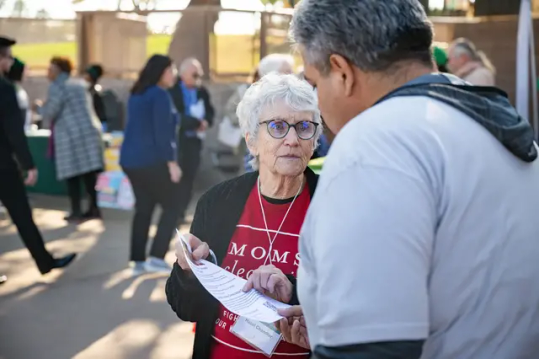
Pictured: Hazel Chandler’s recent activism revolves around her role as the Arizona field coordinator of Moms Clean Air Force, a nonprofit environmental advocacy group.
In some cases, their identities as grandmothers have become an organizing force.
In California, 1000 Grandmothers for Future Generations formed in 2016, after older women from the Bay Area traveled to be in solidarity with Indigenous grandmothers protesting the construction of the Dakota Access Pipeline at the Standing Rock Sioux Reservation.
“When they came back, they decided to form an organization that would continue to mobilize women on behalf of the climate justice movement,” said Nancy Hollander, a member of the group.
1000 Grandmothers — in this case, the term encompasses all older women, not just the literal grandmothers — is rooted at the intersection of social justice and the climate crisis, supporting people of color and Indigenous-led causes in the Bay Area. The organization is divided into various working groups, each with a different focus: elections, bank divestments from fossil fuels, legislative work, nonviolent direct actions, among others...
“There are women in the nonviolent direct action part of the organization who really do feel that elder women — it’s their time to stand up and be counted and to get arrested,” Hollander said. “They consider it a historical responsibility and put themselves out there to protect the more vulnerable.”
But 1000 Grandmothers credits another grandmother activist, Pennie Opal Plant, for helping train their members in nonviolent direct action and for inspiring them to take the lead of Indigenous women in the fight.
Plant, 66 — an enrolled member of the Yaqui of Southern California tribe, and of undocumented Choctaw and Cherokee ancestry — has started various organizations over the years, including Idle No More SF Bay, which she co-founded with a group of Indigenous grandmothers in 2013, first in solidarity with a group formed by First Nations women in Canada to defend treaty rights and to protect the environment from exploitation.
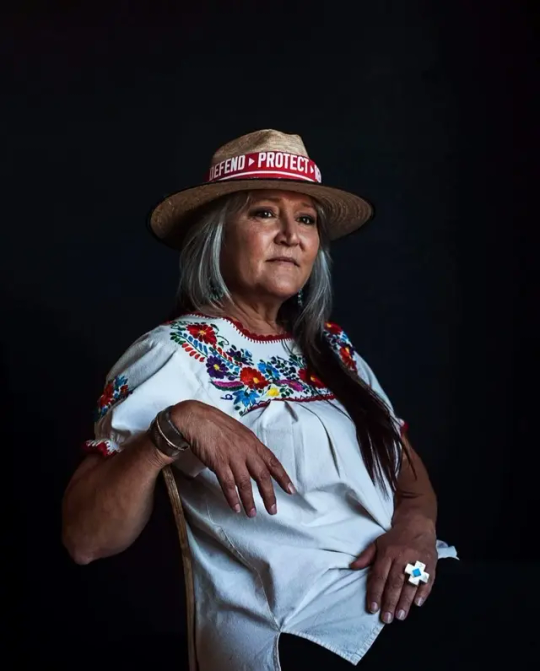
Pictured: Pennie Opal Plant has started various organizations over the years, including Idle No More SF Bay, which she founded in 2013 alongside Indigenous grandmothers.
In 2016, Plant gathered with others in front of Wells Fargo Corporate offices in San Francisco, blocking the road in protest of the Dakota Access Pipeline, when she realized the advantages she had as an older woman in the fight.
As a police liaison — or a person who aims to defuse tension with law enforcement — she went to speak to an officer who was trying to interrupt the action. When she saw him maneuvering his car over a sidewalk, she stood in front of it, her gray hair flowing. “I opened my arms really wide and was like, are you going to run over a grandmother?”
A new idea was born: The Society of Fearless Grandmothers. Once an in-person training — it now mostly exists online as a Facebook page — it helped teach other grandmothers how to protect the youth at protests.
For Plant, the role of grandmothers in the fight to protect the planet is about a simple Indigenous principle: ensuring the future for the next seven generations.
“What we’re seeing is a shift starting with Indigenous women, that is lifting up the good things that mothers have to share, the good things that women that love children can share, that will help bring back balance in the world,” Plant said...
[Kathleen] Sullivan is one of approximately 70,000 people over the age of 60 who’ve joined Third Act, a group specifically formed to engage people 60 and older to mobilize for climate action across the country.
“This is an act of moral responsibility. It’s an act of care. And It’s an act of reciprocity to the way in which we are cared for by the planet,” Sullivan said. “It’s an act of interconnection to your peers, because there can be great joy and great sense of solidarity with other people around this.”
-via The 19th, January 31, 2024
#climate change#climate activism#climate crisis#climate action#grandmother#older adults#elders#feminism#climate hope#family#intergenerational relationships#grandchildren#climate protest#good news#hope#hopepunk#environment#environmental activism#hope posting#boomers#gen z#age
744 notes
·
View notes
Text
Coal pile slide buries, kills 2 at Colorado power plant
Coal pile slide buries, kills 2 at Colorado power plant
PUEBLO, Colo. — A slide on an 80-foot-high (24-meter-high) coal pile killed two staff Thursday at a southern Colorado coal-fired electrical power producing plant, authorities acknowledged after a day-long look for the victims.
Rescuers found the our our bodies of the two males buried beneath about 60 toes (18 meters) of coal throughout the towering pile on the Comanche Generating Station in…
View On WordPress
#buries#business#Coal#Colorado#Corpora#Discrimination#Electric power generation#Electric utilities#Energy industry#Fossil fuel power generation#Human rights and civil liberties#kills#Labor issues#Personnel#pile#plant#power#slide#Social affairs#Social issues#Utilities#Workplace discrimination
0 notes
Text
Jetez un œil à cette histoire que j'ai sauvegardée sur Pocket
Le 100 % renouvelable, s'il est effectivement praticable, dès maintenant, déplaît aux lobbies des énergies fossiles et de l'énergie nucléaire civil.
Est-ce possible ? Ils le soutiennent...
0 notes
Text
"Kendra Ford, a Unitarian Universalist minister and member of No Coal, No Gas, said the sentence reflects how "our legal system doesn't seem to be able to respond to current circumstances."
"The urgency of climate collapse is terrifying, and yet the court's decisions today is focused on protecting profits for companies in the fossil fuel industry," Ford said. "The judge seemed more concerned that these non-violent activists disrupted profits than the fact that the continued use of coal is causing irreparable harm to the planet.""
1 note
·
View note
Text
XR Boston plays basketball in halls of MA State House to demand Governor ban new fossil fuel infrastructure
On Monday September 18, more than 30 climate activists from Extinction Rebellion Boston (XR) played a creative version of basketball in the halls of the Massachusetts State House, to demand that Governor Maura Healey "stop playing games with our future." The activists split into two "teams," one team representing the government (with sponsorship logos for fossil fuel companies on their jerseys) and the other team representing "New Fossil Fuels". On the second floor outside Governor Healey's office, activists made raucous throwing and dribbling motions, while shouting as if in game-play. Meanwhile, other activists playing the role of Massachusetts residents as spectators carried banners and shouted for the game to end. Spectator chants included: "Commonwealth, you’re breaking the rules, don’t pass the ball to Fossil Fuels! You’re our home team, we must win! It’s our planet, go all-in! Fossil fuels, aren’t you ashamed? It’s our future, not a game! We see your fouls to make a basket, there’s no games on a dead planet!"
These activists managed to disrupt business as usual for a full afternoon. After a long game, the crowd of activists occupied the Governor's Constituents office for two hours until eight arrests were made. During the occupation, they chanted together and sang protest songs in high spirits. As arrestees were led away, their cohorts sang "Courage [activist's name], you do not walk alone, we will walk with you, and sing your spirit home."
These activists managed to disrupt business as usual for a full afternoon. After a long game, the crowd of activists occupied the Governor's Constituents office for two hours until nine arrests were made. During the occupation, they chanted together and sang protest songs in high spirits. As arrestees were led away, their cohorts sang "Courage my friend, you do not walk alone, we will walk with you, and sing your spirit home."
Extinction Rebellion Boston's demand is No New Fossil Fuel Infrastructure in Massachusetts.
Banning new fossil fuel infrastructure includes:
NO new fossil fuel power plants
NO new residential or commercial gas connections
NO new or expanded natural gas distribution pipelines, transmission pipelines, or compressor stations
NO new liquified natural gas production facilities, storage facilities, or terminals
NO new gas stations or other gasoline and diesel infrastructure
NO new airports or airfield expansions
Stopping new fossil fuel infrastructure under development includes:
MMWEC’s Peaker Plant in Peabody
NEC’s Liquified Natural Gas Facility in Charlton
LNG expansion to Douglas
L.G. Hanscom Airfield's North Airfield Development in Bedford
"Modernization" projects in Lowell and Worcester
"Reliability" projects in Western Mass. and Sharon-to-Brockton
The Hopkinton-Ashland Transfer Line
Meter stations in Longmeadow and Charlton
Why are we using creative disruption? Asking nicely hasn't kept humanity safe from the effects of climate change, neither has writing letters and petitions, neither has hopes and prayers. The global average temperature for July 2023 is confirmed to be the highest on record for any month, and August 2023 was the hottest August in recorded history. We gasp through wildfire smoke, and our neighbors to the north wade through floodwaters. What more will it take before our government takes action?
Full article here: https://xrboston.org/news/xr-boston-plays-basketball-in-halls-of-ma-state-house-to-demand-healey-administration-ban-new-fossil-fuel-infrastructure/
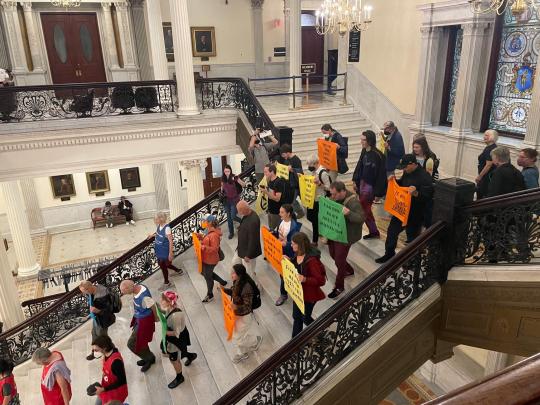


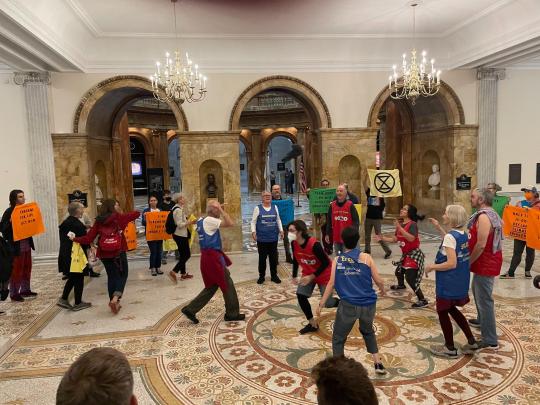


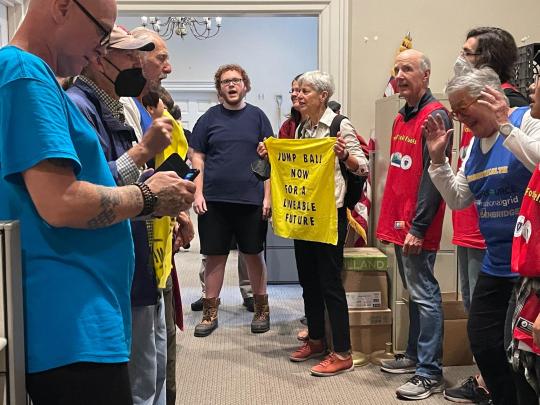

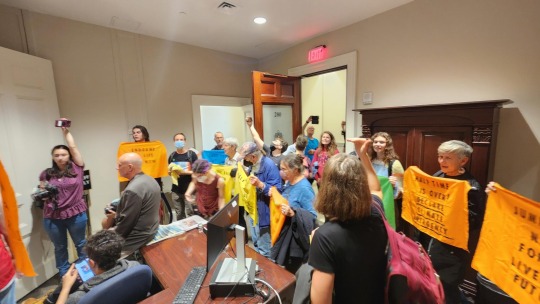
#extinction rebellion#climate activism#civil disobedience#state house#massachusetts#Maura Healey#basketball#chanting#fossil fuels
3 notes
·
View notes
Text
Excerpt from this Op-Ed from the New York Times:
At first glance, Xi Jinping seems to have lost the plot.
China’s president appears to be smothering the entrepreneurial dynamism that allowed his country to crawl out of poverty and become the factory of the world. He has brushed aside Deng Xiaoping’s maxim “To get rich is glorious” in favor of centralized planning and Communist-sounding slogans like “ecological civilization” and “new, quality productive forces,” which have prompted predictions of the end of China’s economic miracle.
But Mr. Xi is, in fact, making a decades-long bet that China can dominate the global transition to green energy, with his one-party state acting as the driving force in a way that free markets cannot or will not. His ultimate goal is not just to address one of humanity’s most urgent problems — climate change — but also to position China as the global savior in the process.
It has already begun. In recent years, the transition away from fossil fuels has become Mr. Xi’s mantra and the common thread in China’s industrial policies. It’s yielding results: China is now the world’s leading manufacturer of climate-friendly technologies, such as solar panels, batteries and electric vehicles. Last year the energy transition was China’s single biggest driver of overall investment and economic growth, making it the first large economy to achieve that.
This raises an important question for the United States and all of humanity: Is Mr. Xi right? Is a state-directed system like China’s better positioned to solve a generational crisis like climate change, or is a decentralized market approach — i.e., the American way — the answer?
How this plays out could have serious implications for American power and influence.
Look at what happened in the early 20th century, when fascism posed a global threat. America entered the fight late, but with its industrial power — the arsenal of democracy — it emerged on top. Whoever unlocks the door inherits the kingdom, and the United States set about building a new architecture of trade and international relations. The era of American dominance began.
Climate change is, similarly, a global problem, one that threatens our species and the world’s biodiversity. Where do Brazil, Pakistan, Indonesia and other large developing nations that are already grappling with the effects of climate change find their solutions? It will be in technologies that offer an affordable path to decarbonization, and so far, it’s China that is providing most of the solar panels, electric cars and more. China’s exports, increasingly led by green technology, are booming, and much of the growth involves exports to developing countries.
From the American neoliberal economic viewpoint, a state-led push like this might seem illegitimate or even unfair. The state, with its subsidies and political directives, is making decisions that are better left to the markets, the thinking goes.
But China’s leaders have their own calculations, which prioritize stability decades from now over shareholder returns today. Chinese history is littered with dynasties that fell because of famines, floods or failures to adapt to new realities. The Chinese Communist Party’s centrally planned system values constant struggle for its own sake, and today’s struggle is against climate change. China received a frightening reminder of this in 2022, when vast areas of the country baked for weeks under a record heat wave that dried up rivers, withered crops and was blamed for several heatstroke deaths.
143 notes
·
View notes
Text
According to documents obtained by Grist and Type Investigations through a Freedom of Information Act request, the FBI’s Minneapolis office opened a counterterrorism assessment in February 2012, focusing on actions in South Dakota, that continued for at least a year and may have led to the opening of additional investigations. These documents reveal that the FBI was monitoring activists involved in the Keystone XL campaign about a year earlier than previously known.
Their contents suggest that, long before the Keystone and Dakota Access pipelines became national flashpoints, the federal government was already developing a sweeping law enforcement strategy to counter any acts of civil disobedience aimed at preventing fossil fuel extraction. And young, Native activists were among its first targets.
“The threat emerging … is evolving into one based on opposition to energy exploration related to any extractions from the earth, rather than merely targeting one project and/or one company,” the FBI noted in its description of the Wanblee blockade.
The 15-page file, which is heavily redacted, also describes Native American groups as a potentially dangerous threat and likens them to “environmental extremists” whose actions, according to the FBI, could lead to violence. The FBI acknowledged that Native American groups were engaging in constitutionally protected activity, including attending public hearings, but emphasized that this sort of civic participation might spawn criminal activity.
To back up its claims, the FBI cited a 2011 State Department hearing on the pipeline in Pierre, South Dakota, attended by a small group of Native activists. The FBI said the individuals were dressed in camouflage and had covered their faces with red bandanas, “train robber style.” According to the report, they were also carrying walking sticks and shaking sage, claiming to be “Wounded Knee Security of/for Mother Earth.”
“The Bureau is uncertain how the NA group(s) will act initially or subsequently if the project is approved,” the agency wrote.
The FBI also singled out the “Native Youth Movement,” which it described as a mix between a “radical militia and a survivalist group.” In doing so, it appeared to conflate a specific activist group originally founded in Canada in the 1990s with the broader array of young Native activists who opposed the pipeline decades later. Young activists would play an important role in the Keystone XL campaign and later on during protests against the Dakota Access pipeline at Standing Rock, but the movement had little in common with militias or survivalists, terms typically used to describe far-right groups or those seeking to disengage from society.
The FBI declined to respond to questions for this story. In an emailed statement, a spokesperson for the Minneapolis field office said the agency does not typically comment on FOIA releases and “lets the information contained in the files speak for itself.”
[...]
Environmental activists and attorneys who reviewed the new documents told Grist and Type Investigations that law enforcement’s approach to the Keystone XL campaign looked like a template for the increasingly militarized response to subsequent environmental and social justice campaigns — from efforts to block the Dakota Access pipeline at Standing Rock to the ongoing protests against the police training center dubbed “Cop City” in Atlanta, Georgia, which would require razing at least 85 acres of urban forest.
The FBI’s working thesis, outlined in the new documents, that “most environmental extremist groups” have historically moved from peaceful protest to violence has served as the basis for subsequent investigations. “It’s astonishing to me how such a broad concept basically paints every activist and protester as a future terrorist,” said Mike German, a former FBI special agent who is now a fellow at the nonprofit Brennan Center for Justice.
255 notes
·
View notes